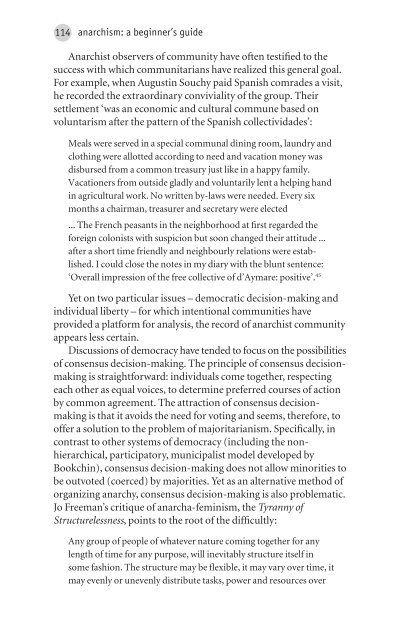o_195qg5dto17o4rbc85q1ge61i84a.pdf
Create successful ePaper yourself
Turn your PDF publications into a flip-book with our unique Google optimized e-Paper software.
114<br />
anarchism: a beginner’s guide<br />
Anarchist observers of community have often testified to the<br />
success with which communitarians have realized this general goal.<br />
For example, when Augustin Souchy paid Spanish comrades a visit,<br />
he recorded the extraordinary conviviality of the group. Their<br />
settlement ‘was an economic and cultural commune based on<br />
voluntarism after the pattern of the Spanish collectividades’:<br />
Meals were served in a special communal dining room, laundry and<br />
clothing were allotted according to need and vacation money was<br />
disbursed from a common treasury just like in a happy family.<br />
Vacationers from outside gladly and voluntarily lent a helping hand<br />
in agricultural work. No written by-laws were needed. Every six<br />
months a chairman, treasurer and secretary were elected<br />
... The French peasants in the neighborhood at first regarded the<br />
foreign colonists with suspicion but soon changed their attitude ...<br />
after a short time friendly and neighbourly relations were established.<br />
I could close the notes in my diary with the blunt sentence:<br />
‘Overall impression of the free collective of d’Aymare: positive’. 45<br />
Yet on two particular issues – democratic decision-making and<br />
individual liberty – for which intentional communities have<br />
provided a platform for analysis, the record of anarchist community<br />
appears less certain.<br />
Discussions of democracy have tended to focus on the possibilities<br />
of consensus decision-making. The principle of consensus decisionmaking<br />
is straightforward: individuals come together, respecting<br />
each other as equal voices, to determine preferred courses of action<br />
by common agreement. The attraction of consensus decisionmaking<br />
is that it avoids the need for voting and seems, therefore, to<br />
offer a solution to the problem of majoritarianism. Specifically, in<br />
contrast to other systems of democracy (including the nonhierarchical,<br />
participatory, municipalist model developed by<br />
Bookchin), consensus decision-making does not allow minorities to<br />
be outvoted (coerced) by majorities. Yet as an alternative method of<br />
organizing anarchy, consensus decision-making is also problematic.<br />
Jo Freeman’s critique of anarcha-feminism, the Tyranny of<br />
Structurelessness, points to the root of the difficultly:<br />
Any group of people of whatever nature coming together for any<br />
length of time for any purpose, will inevitably structure itself in<br />
some fashion. The structure may be flexible, it may vary over time, it<br />
may evenly or unevenly distribute tasks, power and resources over




